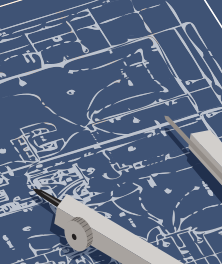Contact Information

- Division
- Business and Technology
- Dean
- Amy Schulz
- Associate Dean
- Darlene Jackson

- Division Office
- B 3, Rocklin Campus
Overview
The Drafting and Engineering Support curriculum is designed to prepare students for careers in industry as engineering support technicians who plan, prepare and interpret engineering sketches for design and drafting relative to mechanical and architectural designs, civil structures and developments, weldments, electronic circuits, or landscape architecture and design. Includes sketching and the application of Computer Aided Drafting and Design (CADD) software to the creation of graphic representations and simulations in support of engineering projects.
AA and AS degrees as well as certificates can be earned in the Drafting and Engineering Support Program. The certificate programs do not satisfy AA/AS degree requirements but do qualify students for a certificate in the field of study.
Faculty
Alison R. Salome
Professor, Drafting and Engineering Support
A.A., Sierra College
Drafting and Engineering Support Advisory Committee
- J.T. Doupnik, Architect, Gary Doupnik Manufacturing, Loomis
- Eric Driever, Architect, William Paddon Associates, Roseville
- Pam Emrick, Designer, Pasco Scientific, Roseville
- Terence J. Green, Architect, William Paddon Associates, Roseville
- Philip Hawkins, Architect, PHA and Associates, Auburn
- Anatole Hulewsky, Designer, ALH and Associates, Fair Oaks
- Stephen M. Jung, Architect, Gordon Rogers and Company, Rocklin
- Eric Kim, CAD Designer, Visual Enterprises, Citrus Heights
- Michael Manasco, Designer, Stantec, Sacramento
- John Masha, P.E., Civil Engineer, MJM Engineering Consultant, Folsom
- Earl McGuire, Engineer, McGuire Engineering, Placerville
- Michael Kent Murphy, AIA, Michael Kent Murphy Architect, Auburn
- Floyd Riffey, Senior Designer, Aerojet—Tech Systems, Sacramento
- Gordon Rogers, Architect, Gordon Rogers and Company, Rocklin
- Christine Thompson, Designer, Lionakis Beaumont, Sacramento
- Phil Titus, AIA, Rauschenbach Marvelli Becker Architects, Sacramento
- Marni Vincent, Design and Build Assistance, Colfax
- Butch Webb, Centex Homes, Roseville
Degrees/Certificates
Associate Degrees
- Drafting and Engineering Support—Architectural/Civil
- Drafting and Engineering Support—Mechanical/Civil
Certificates of Achievement
- Drafting and Engineering Support—Architectural/Civil
- Drafting and Engineering Support—Mechanical/Civil
Skills Certificates
Drafting and Engineering Support—Architectural/Civil
AA or AS Degree and/or Certificate of Achievement
(formerly Engineering Support Technology—Architectural)
Successful completion of the curriculum in Drafting and Engineering Support—Architectural/Civil prepares students for entry-level positions as document support technicians in the fields of architecture, interior design and kitchen/bath design. For the degree, students must fulfill the following major requirements with grades of “C” or better, complete a minimum of 60 degree-applicable semester units (12 of which must be completed at Sierra College) with a grade point average of at least 2.0 and complete one of the following three general education patterns:
- Sierra College Associate Degree Requirements;
- California State University General Education Breadth pattern;
- Intersegmental General Education Transfer Curriculum (IGETC).
A certificate is designed to provide career technical skills; it is not equivalent to an associate degree.
Required Courses
| Code | Title | Units |
|---|---|---|
| DES 0001 | Technical Drafting I | 3 |
| DES 0002 | Technical Drafting II | 3 |
| DES 0010 | Civil Applications of Computer-Aided Design | 3 |
| DES 0020 | Architectural Drawing I | 3 |
| DES 0021 | Architectural Drawing II | 3 |
| DES 0022 | Architectural Drawing III-BIM (Building Information Modeling) | 3 |
| DES 0040 | Managing the Computer-Aided Design (CAD) Environment | 3 |
| DES 0095 | Internship in Drafting and Engineering Support | 0.5-4 |
| Total Units | 21.5-25 | |
Recommended Electives
| Code | Title | Units |
|---|---|---|
| CET 0020 | Foundations and Framing | 3 |
| CET 0022 | Introduction to Energy Efficiency Construction | 3 |
| CET 0024 | Fundamentals of Construction Documents and Estimating | 3 |
| CET 0032 | Residential Building Codes | 3 |
| ENGR 0010 | Engineering Survey Measurements | 4 |
Drafting and Engineering Support—Mechanical/Civil
AA or AS Degree and/or Certificate of Achievement
(formerly Engineering Support Technology—Mechanical/Civil)
Successful completion of the curriculum in Drafting and Engineering Support—Mechanical/Civil prepares students for entry-level positions as document support technicians in the fields of mechanical and civil engineering. For the degree, students must fulfill the following major requirements with grades of “C” or better, complete a minimum of 60 degree-applicable semester units (12 of which must be completed at Sierra College) with a grade point average of at least 2.0 and complete one of the following three general education patterns:
- Sierra College Associate Degree Requirements;
- California State University General Education Breadth pattern;
- Intersegmental General Education Transfer Curriculum (IGETC).
A certificate is designed to provide career technical skills; it is not equivalent to an associate degree.
Required Courses
| Code | Title | Units |
|---|---|---|
| DES 0001 | Technical Drafting I | 3 |
| DES 0002 | Technical Drafting II | 3 |
| DES 0003D | Design for Additive Manufacturing - 3D Printing | 3 |
| DES 0010 | Civil Applications of Computer-Aided Design | 3 |
| DES 0011 | Three-Dimensional Modeling | 3 |
| DES 0020 | Architectural Drawing I | 3 |
| DES 0021 | Architectural Drawing II | 3 |
| DES 0040 | Managing the Computer-Aided Design (CAD) Environment | 3 |
| DES 0095 | Internship in Drafting and Engineering Support | 0.5-4 |
| Total Units | 24.5-28 | |
Recommended Electives
| Code | Title | Units |
|---|---|---|
| ENGR 0010 | Engineering Survey Measurements | 4 |
| WELD 0020 | Introduction to Welding Technology - Career Path | 3 |
Architectural Drafting Specialist
Skills Certificate
Designed to give students the advanced drafting support knowledge and abilities required to enter the workforce at the specialist level. Focuses on skills relative to specialized architectural documentation such as is used in architectural and civil construction trades. Appropriate for students seeking retraining. This is a specialty skills certificate designed to provide career technical skills; it is not equivalent to an associate degree.
Required Courses
| Code | Title | Units |
|---|---|---|
| DES 0020 | Architectural Drawing I | 3 |
| DES 0021 | Architectural Drawing II | 3 |
| DES 0022 | Architectural Drawing III-BIM (Building Information Modeling) | 3 |
| DES 0010 | Civil Applications of Computer-Aided Design | 3 |
| or CET 0022 | Introduction to Energy Efficiency Construction | |
| Total Units | 12 | |
Drafting Essentials
Skills Certificate
Designed to give students the basic drafting support knowledge and abilities required to enter the workforce at an entry level. Focuses on skills relative to the fields of architecture and mechanical computer-aided drafting (CAD). Appropriate for students seeking retraining. A skills certificate is designed to provide career technical skills; it is not equivalent to an associate degree.
Required Courses
| Code | Title | Units |
|---|---|---|
| DES 0001 | Technical Drafting I | 3 |
| DES 0002 | Technical Drafting II | 3 |
| DES 0020 | Architectural Drawing I | 3 |
| DES 0021 | Architectural Drawing II | 3 |
| Total Units | 12 | |
Mechanical Drafting Specialist
Skills Certificate
Designed to give students the advanced drafting support knowledge and abilities required to enter the workforce at the specialist level. Focuses on skills relative to specialized mechanical documentation such as is used in aerospace and automotive drafting. Appropriate for students seeking retraining. Will help successful candidates prepare to sit for the professional ASME (American Society of Mechanical Engineers) Y14.5 Geometric Dimensioning and Tolerancing certification exam. This is a specialty skills certificate designed to provide career technical skills; it is not equivalent to an associate degree.
Required Courses
| Code | Title | Units |
|---|---|---|
| DES 0001 | Technical Drafting I | 3 |
| DES 0002 | Technical Drafting II | 3 |
| DES 0003D | Design for Additive Manufacturing - 3D Printing | 3 |
| DES 0012 | Geometric Dimensioning and Tolerancing | 3 |
| DES 0011 | Three-Dimensional Modeling | 3 |
| or ENGR 0022B | Descriptive Geometry and Solid Modeling | |
| Total Units | 15 | |
Courses
Understanding course descriptions
DES 0001. Technical Drafting I
Units: 3
Formerly known as EST 1
Hours: 90 (36 lecture; 54 laboratory which may be scheduled TBA)
Fundamental use of design equipment to create both two dimensional technical sketches and two and three dimensional computer generated (CAD) working drawings that are used for product definition. Introduction to product and process definition as specified by engineering design disciplines. This course teaches introductory 3D AutoCAD skills. Designed for students with no previous experience in engineering design/drafting. (CSU)
DES 0002. Technical Drafting II
Units: 3
Formerly known as EST 2
Prerequisite: Completion of DES 1 with grade of "C" or better or equivalent as determined by instructor
Hours: 90 (36 lecture; 54 laboratory which may be scheduled TBA)
Intermediate concepts of engineering design including sections, auxiliaries, threads, fasteners, and dimensional tolerancing. Basic concepts of Geometric Dimensioning and Tolerancing. Design for manufacturability and assembly explored to include material selection and properties of materials. This course teaches intermediate/advanced 3D AutoCAD skills. Designed for students who have attained a fundamental knowledge of the processes and practices of engineering design/drafting. (CSU)
DES 0003D. Design for Additive Manufacturing - 3D Printing
Units: 3
Hours: 90 (36 lecture, 54 laboratory)
Introduction to design for 3D printing through machine operation and use of design software to create geometric models to satisfy defined requirements. Introduction to product design process and exploration of additive manufacturing (3D printings) impact on that process, as well as manufacturing. Designed for students with no prior experience with 3D printing or design. (not transferable)
DES 0010. Civil Applications of Computer-Aided Design
Units: 3
Formerly known as EST 10
Prerequisite: Completion of DES 2 or 20 with grade of "C" or better or equivalent as determined by instructor
Hours: 90 (36 lecture; 54 laboratory which may be scheduled TBA)
Development of drafting skills used in the areas of industrial and civil engineering support. Emphasis on land division, determination of location and direction, development of plots based upon legal description and the fundamentals of utilizing surveying data as applied to preliminary and final maps. Designed for students who have attained an intermediate knowledge of the processes and practices of engineering design/drafting support. Introduction to AutoCAD Civil 3D software. (CSU)
DES 0011. Three-Dimensional Modeling
Units: 3
Formerly known as EST 11
Prerequisite: Completion of DES 2 or MECH 44 with grade of "C" or better; or equivalent as determined by instructor
Hours: 90 (36 lecture; 54 laboratory which may be scheduled TBA)
Processes employed in developing design solutions using a feature based parametric solid modeler. Includes part and assembly modeling, and the development of 2-dimensional part and assembly drawings. SolidWorks is the solid modeler used. (CSU, UC)
DES 0012. Geometric Dimensioning and Tolerancing
Units: 3
Formerly known as EST 12
Prerequisite: Completion of DES 2 with grade of "C" or better or equivalent as determined by instructor
Hours: 54 lecture
Expands upon basic knowledge of dimensioning mechanical drawings by adding form and feature controls in order to clearly define parts. Review of basic dimensioning and tolerancing. Topics, as defined in ASME Y14.5-2009 Standard, include geometric tolerancing symbols and terms, rules of geometric dimensioning and tolerancing, datums, material condition symbols, tolerances of form and profile, tolerances of orientation and runout, location tolerances and virtual condition. (CSU)
DES 0020. Architectural Drawing I
Units: 3
Formerly known as EST 20
Hours: 90 (36 lecture; 54 laboratory which may be scheduled TBA)
Introduction to the fundamentals of residential construction and design documentation. Drawings of a residence are developed and detailed, to include sketches, site plan and floor plans, foundation, elevations, and section views. AutoCAD instruction is incorporated to develop CAD drawings and electronic data sets. (CSU)
DES 0021. Architectural Drawing II
Units: 3
Formerly known as EST 21
Prerequisite: Completion of DES 20 with grade of "C" or better or equivalent as determined by instructor
Hours: 90 (36 lecture; 54 laboratory which may be scheduled TBA)
Advances the skills and knowledge of residential architectural drawing production started in DES 20. Course focuses on production of residential architectural drawings of a 2-story wood framed house in the context of current and relevant building codes, construction materials and methods, industry standard work flow, production and graphic standards through the use of a drawing software application. Additional skills of software utilization, drawing management, complex drawing creation and printing will be covered. This course teaches intermediate AutoCAD skills. (CSU)
DES 0022. Architectural Drawing III-BIM (Building Information Modeling)
Units: 3
Prerequisite: Completion of DES 21 with grade of "C" or better or equivalent as determined by instructor
Hours: 90 (36 lecture; 54 laboratory which may be scheduled TBA)
Continuation of the architectural design started in DES 20 and 21. Students utilize Building Information Modeling (BIM) using REVIT software to develop commercial architectural documentation (including electronic data sets) in adherence to the International Building Code (IBC) and local county and state codes. (CSU)
DES 0028. Independent Study
Units: 1-3
Formerly known as EST 28
Designed for students interested in furthering their knowledge at an independent study level. Independent study might include, but is not limited to, research papers, special subject area projects, and research projects. See Independent Study page in catalog. (CSU)
DES 0040. Managing the Computer-Aided Design (CAD) Environment
Units: 3
Formerly known as EST 40
Prerequisite: Completion of DES 10, 11 or 22 with grade of "C" or better, or equivalent as determined by instructor
Advisory: Completion of DES 3D with grade of "C" or better
Hours: 90 (36 lecture; 54 laboratory which may be scheduled TBA)
Designed for the advanced Drafting and Engineering Support student. Topics include proper CAD management skills and the development of "as built" models used in the manufacturing, architectural and civil disciplines. Focus on utilizing, creating and instituting CAD standards, policies and procedures. Development of prototypes integral to the design process in their chosen area of concentration (mechanical, civil and/or architecture). (CSU)
DES 0095. Internship in Drafting and Engineering Support
Units: 0.5-4
Formerly known as EST 95
Designed for advanced students to work in an area related to their educational or occupational goal. Provides new on-the-job technical training under the direction of a worksite supervisor, allowing students to expand knowledge and skills in the chosen field. Mandatory orientation session and faculty approval to determine eligibility. One unit of credit is equal to each 60 hours of non-paid work, or each 75 hours of paid work. Students may earn up to a total of 16 units in internship courses (any course numbered 95 and PDEV 94). (CSU-with unit limitation)
Program Student Learning Outcomes (PSLOs)
- Demonstrate computer aided drafting practices that conform to business and industry CAD standards.
- Demonstrate a working knowledge of the design process and the importance of concurrent engineering principles.
- Apply appropriate, current and relevant industry standards in preparing technical documentation for the appropriate discipline of their study.
- Develop complete working drawings in discipline of study for use in manufacturing/building application.



